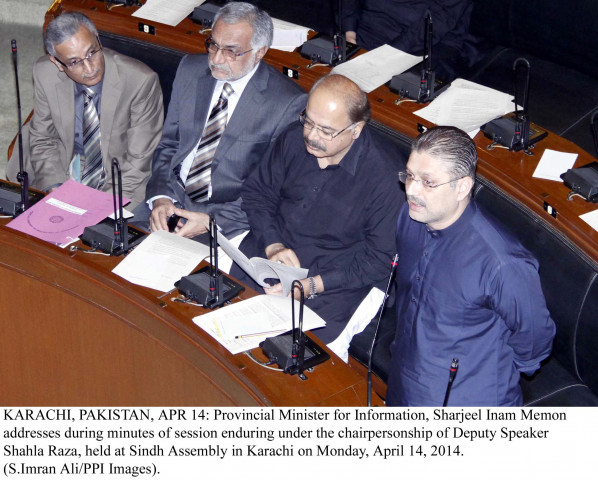Drip...drip...drip: Sindh MPAs stare at drinking water crisis
This was the first time an MPA from the MQM openly criticised KWSB and city administration.

Sindh information minister speaking during the assembly session on Monday. PHOTO: PPI
They believe water shortage in Karachi and other districts of the province might trigger a 'civil war.'
"For the last four to five months there has been no water in many areas of Karachi," said Muttahida Qaumi Movement (MQM) MPA Muhammad Hussain. "The residents of Baldia, Orangi Town, Qasba Colony and Gulshan-e-Iqbal have started occupying water pumps and disrupting the law and order situation. The Karachi Water and Sewerage Board (KWSB) and the local government have failed to provide the citizens of this city with water." He added that concrete measures should be taken before the water problem spirals out of control.
This was the first time an MPA from the MQM openly criticised the KWSB and the city administration.
According to Hussain, Karachi used to get 115 million gallons per day (MGD) from Hub but the quantity has been reduced to 40MGD. He requested the house to form a committee to visit different areas of the city in order to understand the suffering of the residents.
Sindh's information and local government minister, Sharjeel Inam Memon, acknowledged the water crisis and said district West and Central were the worst affected in the city.
The minister said the situation had become worse as it hadn't rained in some time and Hub Dam was drying up fast. In addition, he said, the illegal hydrant mafia had grown and people were stealing water from the main supply lines.
Memon added that his department had written letters to the Rangers and IG police for their help in taking action against the illegal hydrant operators.
The minister believed that K-Electric was to be blamed for hours of loadshedding at the water pumping stations. "K-Electric being private utility company has made the lives of citizens miserable," he said. "It has become a mafia. Despite paying millions of rupees the power utility company has yet to provide electricity connection for River Osmosis Plant (ROs) established by the provincial government in many areas of the city to convert brackish water into potable."
As the MPAs continued to talk about water, Pakistan Peoples Party's (PPP) Nadir Magsi brought up the issue of illegal water courses set up by the people of Balochistan at Saifullah Magsi Canal in Qambar-Shahdahkot district. He said that officials from the province's irrigation department were involved in stealing water and creating an artificial shortage.
This prompted PPP MPA Nawab Taimur Talpur to move a resolution demanding the provinicial government remove illegal outlets from the main canals and take action against the irrigation officials.
Toxic water
The issue of poisonous water flowing from the Punjab to Sindh was brought up by the MQM's Naheed Begum. She asked the House why water mixed with industrial waste from the Punjab was being disposed off in Sindh.
"We want to know if the provincial government has ever registered a complaint or protest with the authorities of the other province," she said. The minister for parliamentary affairs, Dr Sikandar Mandhro, said they had taken up the issue with the Government of Punjab and would raise it again if the problem persisted.
The MPA said Ghotki is one of the most fertile lands in the province and was turning barren. In addition, she said, the water was causing gastro diseases in the area.
The members of the assembly demanded the federal government to implement the 1991 accord in order to provide Sindh with the water it was due and stop illegal canals - Chasma and Jhelum link canals - which according to them take up most of the water coming in from the Indus River.
Hostage release
Pakistan Muslim League-Functional's Nusrat Seher Abbasi questioned the performance of the home department, which is currently being looked after by the chief minister of Sindh.
"After negotiations between the Taliban and federal government to release militants, notorious dacoits are also being released from the jails in Sindh," she said, referring to the release of a kidnapped Hindu businessman, Lachman Das, in Sukkur. His abductors, she said, were paid Rs6 million in ransom and had asked for the release of their men from jail.
"We, as lawmakers of this house, are confused as to how the affairs of the home department are being run," said Abbasi. "More than 50 people, including minors, are being held hostage by dacoits but we don't see much effort on the part of government." She asked the chief minister to brief the house about what was being done about the prisoners release.
Sectarian violence
The leader of the opposition, Faisal Subzwari, raised the issue of sectarian violence and 45 persons of the MQM who were still missing, and who, according to him were kidnapped by people dressed in plain clothes.
Memon said the violence did not have anything to do with ethnicity or sects.
During the session the assembly adopted a unanimous resolution to initiate compulsory vocational technical training at juvenile jails in the province to develop skills among the prisoners.
Published in The Express Tribune, April 15th, 2014.


















COMMENTS
Comments are moderated and generally will be posted if they are on-topic and not abusive.
For more information, please see our Comments FAQ